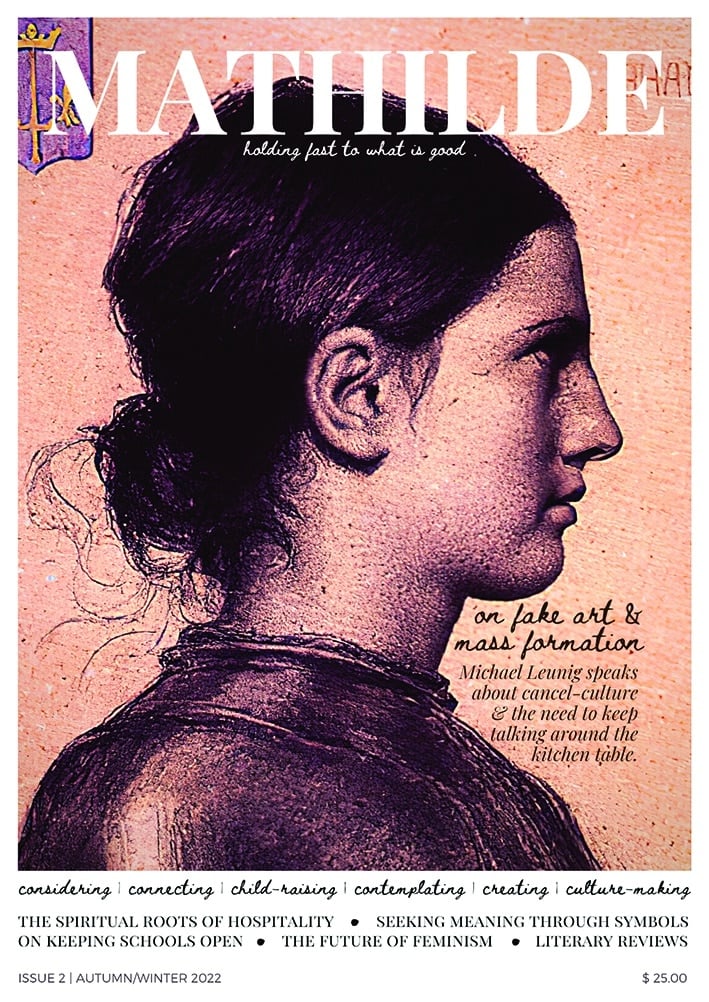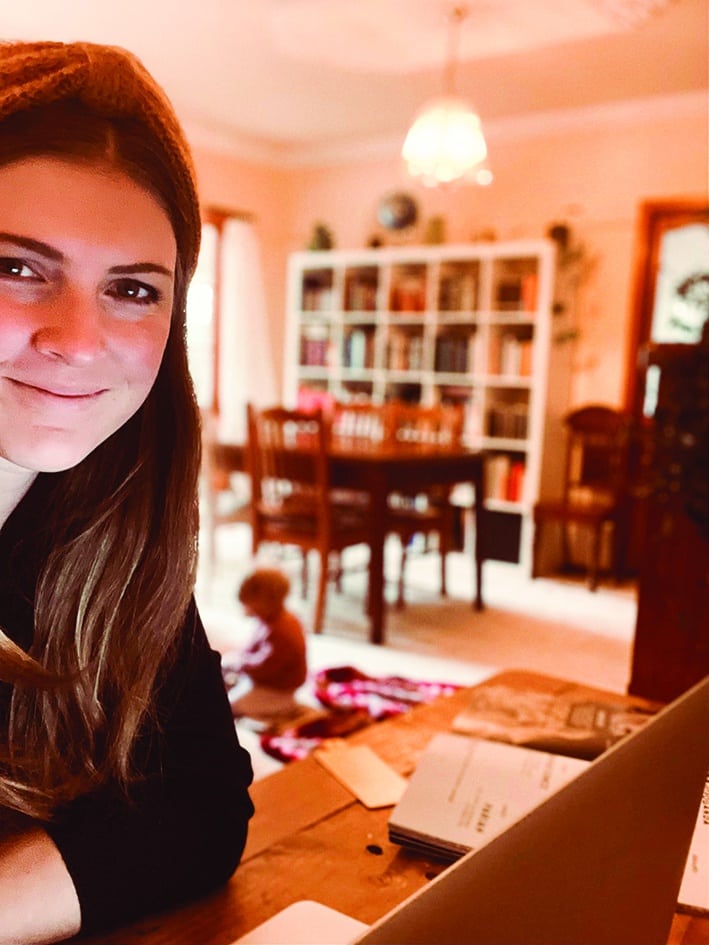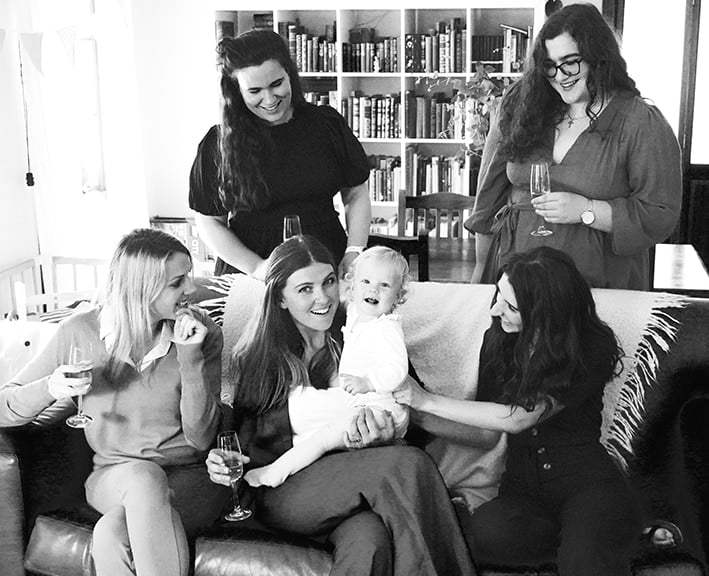
How a group of friends are reclaiming a lost ethic of femininity, challenging assumptions, and analysing the effects of social trends on women and families
A smart new Australian magazine aims to break across today’s increasingly restrictive political and cultural boundaries and reclaim the treasures of the Judeo-Christian tradition for today’s women.
Catholic mother of four Veronika Winkles, 29, is the founder and editor of Mathilde Magazine, a high print quality biennial magazine intended to stand firmly against cancel culture, reclaim the original spirit of feminism and explore the legacy of western heritage.
The Spring/Summer 2021 launch edition, which quickly sold out, explored the question about whether it’s possible to be a ‘conservative greenie’, issues around finding love online, an interview with a self-described ‘homemaker’, and an interview with Margaret Court, the tennis legend who came under fire for expressing traditional views on marriage.
The upcoming edition includes interviews with artist Michael Leunig and political philosopher at the University of Melbourne, Holly Lawford-Smith.
Not just for Christians or Catholics, the Mathilde team includes two Catholic women, two Serbian Orthodox women and an atheist.
The Catholic Weekly spoke with Veronika from her Melbourne home about the genesis and vision for Mathilde. Here are some highlights, edited for brevity:
How did the idea of starting a magazine come to you?
I was nursing my nine-week-old baby, Edith at the time and I was scrolling through the news on my phone.
And I came across a news article about some legislation before the British Parliament which was aimed at changing the terminology around breastfeeding and pregnant women.
That was kind of like a snapping point, it felt really personal and it was so clear to me in that moment that this is not helping women.
We need to speak out against that and say for instance, that it is really derogatory to talk about women as ‘a menstruating person’. Radical feminism now has got to the point where they’re now talking about trans-exclusionary radical feminists. The whole of identity politics has become such a mess and it’s a part of what we’re trying to combat.

What do you mean by reclaiming feminism?
If you take feminism back to its basic core belief, it is about equal rights and equal opportunities with an origin, ironically, in Christianity, because that was the first belief system which really saw women as equals, as we see in St Paul’s writings.
I don’t think there’s a clear answer to the question of what’s going to make women better, but I think we need to give women an alternative to much of the toxic feminism that is out there, which is not just a conservative reaction of going back to the 1950s.
We have Kate Cleary [founder of The Farm at Galong, a wholistic rehabilitation centre for women] in our first issue and she says that when women are going well, society is going well, and I really think that’s true. I’m not a man hater, I’ve got a son, I’ve got a husband, I’ve got five brothers; as part of reclaiming feminism we really want to support men because things are difficult for men now as well.
That was kind of like the snapping point. It felt really personal … this is not helping women. We need to speak out against that and say that it is really derogatory to talk about women as ‘a menstruating person.’
What’s your vision for Mathilde?
We’re not shying away from topics that are a little bit prickly or controversial. We’re trying to give people the conceptual tools to be able to sit with an uncomfortable subject long enough to sort of see and start to understand the other position. In the Socratic tradition if you’ve got to argue for something you have to understand [the other side] well. And I also like St John Henry Newman’s idea of a university, that it is not to teach you what to think but how to think well.
I really think that’s going to be the way forward to try and find the common ground between people and try and be the antidote to the polarisation which I feel is happening between the right and left, conservatives and progressives, and even Catholics and non-Catholics. Now that can be done in a way that’s a little bit bland, like we can all love one another and just get along, but we’re not trying to do that.
We’ve got clear boundaries in what we think and articulate and we’re not going to be shy about saying things as we see them. But we are still trying to work with people who think very differently to see what do we have in common and ask ‘Can we go from there to start a conversation about these things?’.

How did the team come together?
I basically just sent out an email to a group of friends saying, ‘Hey, I’ve got this idea. I’d love to hear if anyone’s interested to get involved or has any ideas for it’. Essentially, the first few people who got back to me ended up becoming the team, they were so enthusiastic about it, although there have been many others who’ve been very supportive and excited by it.
What was the first issue about?
The theme was ‘home’, which encompasses a lot of things and different things for different people, but for us as we explained in that launch issue, it enables us to have an attitude of openness if we have a place from which to set out from, a place from which to pivot.
We’re not talking about the physical place so much as the philosophical place, our belief system and our understanding of reality and how we make sense of the world.
Is this magazine just for Catholics or Christians?
No, we want to reach anyone who is willing to try and suspend their assumptions and sit with a difficult subject and in a way that we can treat it well. And we will always present it beautifully. But certainly we are also trying to celebrate the good in the Western tradition.
Yes, there have been some things that had to change but we don’t want to throw the baby out with the bathwater.
And I think we’ve lost a lot and are losing a lot and are in danger of doing that.
Just because something is old, doesn’t mean it’s bad. Which is why, for example, we’re putting a lot of beautiful old artworks in our issues. Just to air them a little bit.
What were you doing before this?
“We want to reach anyone who is willing to try and suspend their assumptions and sit with a difficult subject and in a way that we can treat it well”.
I have a degree in history and the history and philosophy of science and a Master of Arts focusing on theology which I did at the Catholic Theological College.
The magazine is giving me an opportunity to incorporate a few passions of mine like writing, art and design, and just meeting some really interesting people. I just find this all fascinating, it’s been very inspiring and enlivening.
Order a copy of issue two of Mathilde Magazine online at www.mathildemagazine.com where there is also information about how to become a sponsor.
